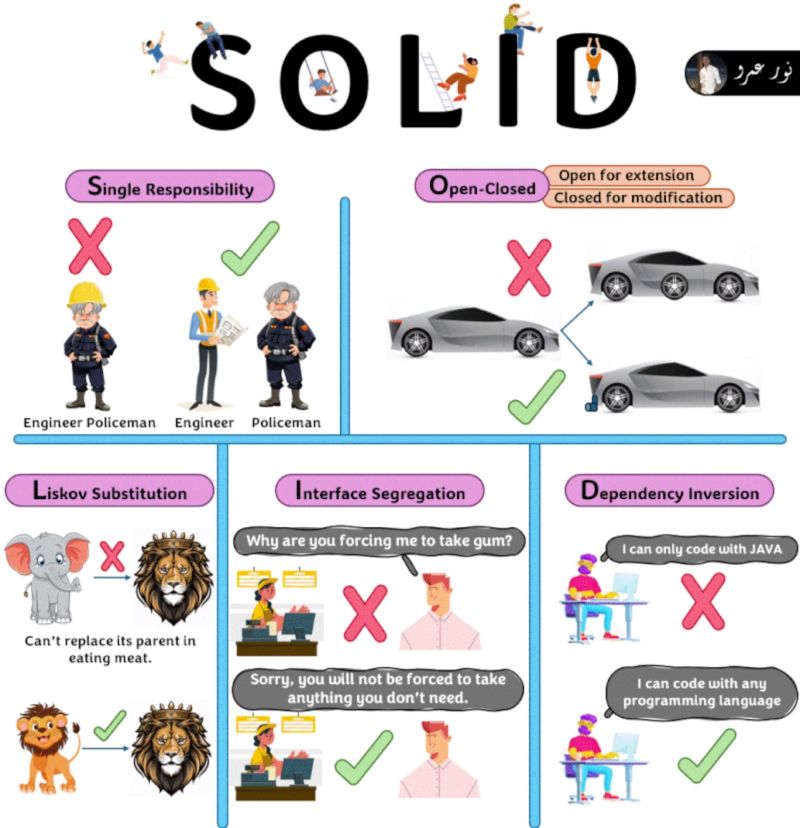Master the SOLID Foundations of Clean Code!.
💥 S – Single Responsibility Principle (SRP):
Each class should focus on a single task, encapsulating all aspects of that responsibility. This results in modular, easy-to-understand code.
🚀 O – Open/Closed Principle (OCP):
Design your software so it’s open for extension but closed for modification. Use interfaces and abstract classes to allow future growth without altering existing code.
🔄 L – Liskov Substitution Principle (LSP):
Derived classes must be usable as their base classes without affecting the program’s correctness. This ensures seamless interchangeability of components.
🔧 I – Interface Segregation Principle (ISP):
No client should be forced to depend on methods it doesn’t use. Create focused interfaces tailored to specific client needs, avoiding unnecessary dependencies.
🔗 D – Dependency Inversion Principle (DIP):
High-level modules should rely on abstractions, not concrete implementations. Invert dependencies by ensuring that details depend on abstractions, not the other way around, for greater flexibility and maintainability.
Learn more about web development from freeCodeCamp JavaScript Mastery W3Schools.com GeeksforGeeks GreatFrontEnd
Credits: Behzad Dara
#CleanCode #SoftwareDevelopment #SOLIDPrinciples #CodingBestPractices #TechLeadership #CodeQuality #SoftwareEngineering #DevCommunity #ProgrammingTips #TechInsights #html #css #100daysofcode #programming
ترجمه:
بر پایه های جامد Clean Code مسلط شوید!
💥 S – اصل مسئولیت واحد (SRP):
هر کلاس باید بر روی یک کار واحد تمرکز کند و تمام جنبه های آن مسئولیت را در بر بگیرد. این منجر به کدهای ماژولار و آسان برای درک می شود.
🚀 O – اصل باز/بسته (OCP):
نرم افزار خود را طوری طراحی کنید که برای افزودن باز باشد اما برای اصلاح بسته باشد. از رابط ها و کلاس های انتزاعی استفاده کنید تا امکان رشد آینده را بدون تغییر کد موجود فراهم کنید.
🔄 L – اصل تعویض لیسکوف (LSP):
کلاس های مشتق شده باید به عنوان کلاس های پایه خود بدون تأثیر بر صحت برنامه قابل استفاده باشند. این قابلیت تعویض بدون درز اجزا را تضمین می کند.
🔧 I – اصل جداسازی رابط (ISP):
هیچ مشتری نباید مجبور شود به روش هایی که استفاده نمی کند وابسته باشد. ایجاد رابط های متمرکز متناسب با نیازهای مشتری خاص، اجتناب از وابستگی های غیر ضروری.
🔗 D – اصل وارونگی وابستگی (DIP):
ماژولهای سطح بالا باید بر انتزاعات تکیه کنند، نه اجرای ملموس. وابستگی ها را با حصول اطمینان از اینکه جزئیات به انتزاعات وابسته هستند، برای انعطاف پذیری و نگهداری بیشتر، نه برعکس، وارونه کنید.
درباره توسعه وب از freeCodeCamp JavaScript Mastery W3Schools.com GeeksforGeeks GreatFrontEnd بیشتر بیاموزید
اعتبار: بهزاد دارا
#CleanCode #SoftwareDevelopment #SOLIDPPrinciples #CodingBest Practices #TechLeadership #CodeQuality #Software Engineering #DevCommunity #Programming Tips #TechInsights #html #css #100daysofcode #programming
















